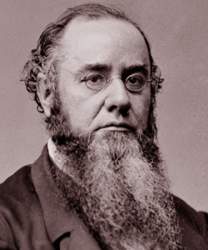Record Data
Source citation
Reprinted in Benson J. Lossing, The Pictorial History of the Civil War in the United States of America (Hartford, CT:: T. Belknap, 1868), III: 574-575.
Type
Executive record
Date Certainty
Exact
Transcriber
John Osborne
Transcription date
Transcription
The following text is presented here in complete form, as it originally appeared in print. Spelling and typographical errors have been preserved as in the original.
Reasons for Rejection
1st. It was an exercise of authority not vested in General Sherman, and, on its face, shows that both he and Johnston knew that General Sherman had no authority to enter into any such arrangements.
2d. It was a practical acknowledgment of the rebel Government.
3rd. It undertook to re-establish rebel State Governments that had been overthrown at the sacriflce of many thousand loyal lives, and immense treasure ; and placed arms and munitions of war in the bands of rebels at their respective capitals, which might be used so soon as the armies of the United States were disbanded, and used to conquer and subdue loyal States.
4th. By the restoration of rebel authority, in their respective States, they would be enabled to re-establish Slavery.
5th. It might furnish a ground of responsibility on the part of the Federal Government, to pay the rebel debt, and certainly subjects loyal citizens of rebel
States to debts contracted by rebels in the name of the State.
6th. It puts in dispute the existence of loyal State Governments, and the new State of West Virginia, which had been recognized by every department of the United States Government
7th. It practically abolished confiscation laws, and relieved rebels of every degree, who had slaughtered our people, from all pains and penalties for their crimes.
8th. It gave terms that had been deliberately, repeatedly, and solemnly rejected by President Lincoln, and better terms than the rebels had ever asked in their most prosperous condition.
9th. It formed no basis of true and lasting peace, but relieved rebels from the presence of our victorious armies, and left them in a condition to renew their efforts to overthrow the United States Government and subdue the loyal states whenever their strength was recruited and any opportunity should offer.





